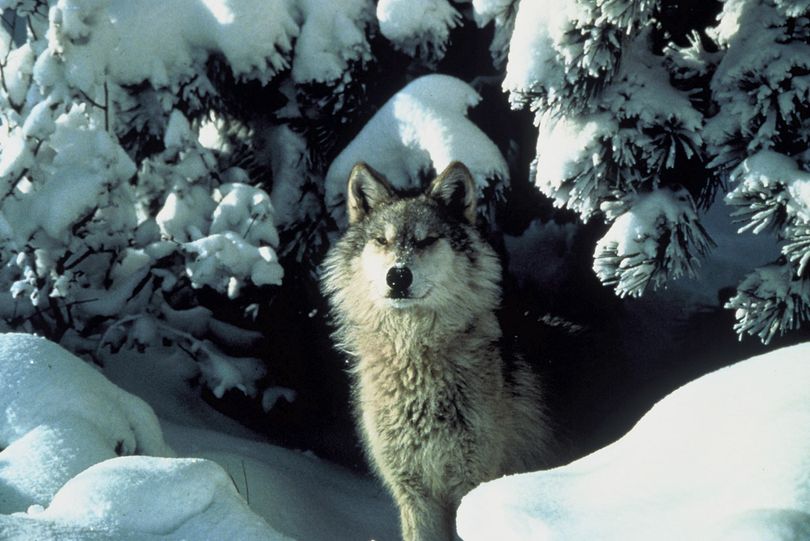Wolves targets of legislation, bullets, traps, rumors

PREDATORS – Here’s a lengthy update on gray wolf news, issues and activities in the region, including bills being considered this week:
WASHINGTON LEGISLATURE
Still alive in Olympia is a bill that could let landowners kill wolves caught in the act of attacking pets or livestock.
Senate Bill 5187, introduced by Sen. John Smith, R-Colville, is scheduled for a hearing Wednesday morning (March 20).
While some conservation groups oppose most measures that involve killing wolves, which are listed as endangered in Washington, state Fish and Wildlife officials tend to support the bill.
Wyoming, Montana and Idaho had similar laws in place between 1995 and 2003, and only three wolves were shot by landowners during those years, said Nate Pamplin, the state’s wildlife division director.
“There are some positive aspects of this bill,” he told the Seattle Times. While the impact to wolf populations would be negligible, “It can help reduce animosity between ranchers and the government because people will feel like they can protect their property.”
Senate Bill 5193, also introduced by Smith and supported by WDFW, would designate up to $50,000 a year in department funding to compensate ranchers for livestock losses from wolves and tap special license plates receipts for some of the funds.
IDAHO LEGISLATURE
A bill that could tap a sportsman-funded Idaho Fish and Game Department account and raise money to compensate ranchers and help control wolf damage has been sent to the House floor with a "do-pass" recommendation from the Agricultural Affairs Committee.
House Bill 278 was introduced by Rep. Judy Boyle, a Republican rancher from Midvale.
WOLF SIGHTINGS
Among the many wolf sightings reported in the region, some are more credible than others, including the black wolf wearing a collar and running with another wolf west of St. John, Wash., in recent months. The collar was not attached in Washington. It could be from Idaho, but the collar apparently is no longer transmitting so there’s been no confirmation.
The responses I received from Washington and Idaho wildlife biologists offer a little insight into the vaguery of research tools.
“The wolf could be from either Idaho or Montana (or even B.C. I guess),” said Jim Hayden, Idaho Fish and Game Panhandle Regional wildlife manager.
“All of us have plenty of collars that have gone off the air, or dispersed.”
Wolves get around, he said, noting a collared wolf seen in Washington could have originated from Idaho, Oregon, Montana or even British Columbia.
“I did get a call several weeks ago now from a Washington bio about this wolf. We have not collared any black wolves in this region, but a couple days prior we had reports of two wolf tracks near Windy Bay, on the west side of Lake CDA, so that lends credence to the theory that those two wolves came from/through Idaho.
“We have four collars active in the Panhandle, three south of I90 and one north of the corridor.”
Glen Hickey, Idaho Fish and Game in Lewiston, emphasized Hayden’s point about wolves getting around.
“One wolf collared in a study in Unit 10 north of Orofino and was killed by a hunter in unit 39 south of Lowman – third of the wat acorss the state, he said. “Another one collared in the same study area was harvested in Montana near Helena. Given that backdrop, it’s anyone’s guess where that wolf in Washington came from.”
Wolf OR7 came back to Oregon on March 12. The wolf, born and fixed with a GPS collar in Oregon, crossed into California on Dec. 28, 2011. It was a rock star as the only known wolf in the state. Back home after more than 14 months, it joins at least 53 other wolves documented in Oregon.
WOLF MEETINGS
The potential impact of wolves on northeastern Washington game species such as deer and elk will be discussed in a public meeting set by the Washington Department of Fish and Wildlife on Wednesday (March 27) in Colville.
The meeting is scheduled from 6 p.m. to 8 p.m. at the Colville Ag Trade Center, 317 West Astor Ave.
WOLF TRAPPING
The Idaho Clearwater Region’s last wolf trapper education course of the season will be held March 30 in Lewiston.
